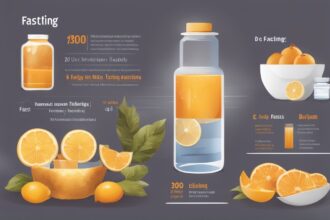Hey there, health enthusiasts! If you’ve been curious about the buzz surrounding fasting detox and its incredible potential to transform your well-being, you’re in the right place. Fasting, a practice as old as humanity itself, has gained modern traction for its numerous health perks—often referred to as fasting benefits. Whether you’re looking to cleanse your body, boost mental clarity, or simply reset your relationship with food, a fasting detox might just be the game-changer you need. In this post, we’ll dive deep into what fasting detox entails, explore the science behind its advantages, and share actionable tips to help you get started safely. Let’s unpack how fasting can be a powerful tool for revitalizing your body and mind!
What Is Fasting Detox and How Does It Work?
Fasting detox is a structured approach to abstaining from food or specific food groups for a set period to allow your body to cleanse itself of toxins and reset metabolic processes. Unlike trendy juice cleanses or restrictive diets, fasting taps into your body’s natural ability to heal and repair. When you fast, your digestive system gets a break, and your body shifts its focus to cellular repair, fat burning, and eliminating waste. This process, often linked to the fasting benefits of autophagy—where cells recycle damaged components—can promote longevity and overall health (Levine et al., 2017). Whether it’s intermittent fasting (IF), water fasting, or a juice fast, the goal of a detox through fasting is to support your body’s innate detoxification systems, primarily handled by the liver and kidneys.
The Science Behind Fasting Benefits for Detox
Let’s get into the nitty-gritty of why fasting works for detox. When you stop eating for an extended period, your body enters a state called ketosis, where it burns fat for fuel instead of glucose. This metabolic switch not only aids in weight loss but also triggers a cascade of cellular benefits. Studies have shown that fasting can reduce inflammation, a key driver of chronic diseases, by lowering levels of pro-inflammatory markers in the blood (Faris et al., 2012). Additionally, fasting enhances autophagy, a process where your cells clean out damaged proteins and toxins, potentially reducing the risk of neurodegenerative diseases (Mattson et al., 2017). These fasting health advantages aren’t just hype—they’re backed by science and show how a well-planned fast can be a reset button for your body.
Key Fasting Benefits for Physical and Mental Wellness
The perks of fasting extend far beyond a simple detox. Physically, fasting can improve insulin sensitivity, helping to stabilize blood sugar levels and reduce the risk of type 2 diabetes (Barnard et al., 2019). It also supports heart health by lowering blood pressure and improving cholesterol profiles (Tinsley & La Bounty, 2015). Mentally, many fasters report heightened clarity and focus, likely due to increased production of brain-derived neurotrophic factor (BDNF), a protein that supports brain health (Mattson et al., 2018). Here are some of the standout fasting benefits for wellness that might inspire you to give it a try:
- Improved metabolic health through better insulin regulation.
- Enhanced fat loss by promoting ketosis and calorie restriction.
- Reduced inflammation, which can alleviate chronic pain and disease risk.
- Boosted mental clarity and mood due to hormonal and neurochemical changes.
- Support for cellular repair through autophagy and reduced oxidative stress.
How to Start a Fasting Detox Safely
Excited to reap the fasting detox benefits? Before you jump in, it’s crucial to approach fasting with preparation and caution, especially if you’re new to it or have underlying health conditions. Start by choosing a fasting method that suits your lifestyle—intermittent fasting (like the 16:8 method, where you fast for 16 hours and eat during an 8-hour window) is often the easiest entry point. Always consult a healthcare provider if you’re on medication or have conditions like diabetes. Hydration is non-negotiable during a fast; aim for plenty of water and electrolyte-rich fluids to avoid dehydration. Here are some practical tips to ensure a safe and effective fasting detox:
- Ease into fasting by gradually reducing meal frequency over a few days.
- Focus on nutrient-dense foods during eating windows to support your body.
- Avoid overexertion; stick to light activities like walking during longer fasts.
- Listen to your body—if you feel dizzy or unwell, break the fast with a small meal.
Common Myths About Fasting Detox Debunked
Despite the growing popularity of fasting, misconceptions abound. One common myth is that fasting means starving yourself, which couldn’t be further from the truth. When done correctly, fasting is a controlled practice that provides your body with rest, not deprivation. Another myth is that fasting slows your metabolism—research actually suggests that short-term fasting can boost metabolic rate by increasing norepinephrine levels (Zauner et al., 2000). There’s also the idea that fasting is only for weight loss, but as we’ve discussed, the health benefits of fasting span mental clarity, cellular repair, and disease prevention. Don’t let these myths deter you; fasting, when approached mindfully, can be a sustainable health tool.
Who Should Avoid Fasting Detox?
While the fasting benefits are impressive, it’s not a one-size-fits-all solution. Certain groups should steer clear of fasting or seek medical guidance before starting. Pregnant or breastfeeding women, for instance, need consistent nutrition for themselves and their babies. Individuals with eating disorders should avoid fasting, as it may trigger unhealthy behaviors. Those with chronic conditions like kidney disease or low blood pressure should also consult a doctor, as fasting can exacerbate symptoms. Your safety comes first, so always prioritize personalized advice over general trends when considering a fasting detox.
As we wrap up, it’s clear that fasting detox offers a wealth of fasting benefits—from physical rejuvenation to mental sharpness—that can elevate your health in ways you might not have imagined. The science supports its role in reducing inflammation, enhancing cellular repair, and improving metabolic markers, while countless personal stories highlight its transformative power. If you’re ready to explore fasting, start small, stay informed, and listen to your body’s signals. Remember, fasting isn’t just a trend; it’s a time-tested practice that, when done right, can help you feel your best. So, why not give it a shot and see how a fasting detox could work for you? Drop a comment below if you’ve tried fasting or have questions—I’d love to hear from you!
References
- Barnard, N. D., Goldman, D. M., Loomis, J. F., Kahleova, H., Levin, S. M., Neabore, S., & Baticado, K. F. (2019). Plant-based diets for reversing disease and promoting health: A systematic review. American Journal of Lifestyle Medicine, 13(4), 344-358.
- Faris, M. A., Kacimi, S., Al-Kurd, R. A., Fararjeh, M. A., Bustanji, Y. K., Mohammad, M. K., & Salem, M. L. (2012). Intermittent fasting during Ramadan attenuates proinflammatory cytokines and immune cells in healthy subjects. Nutrition Research, 32(12), 947-955.
- Levine, B., & Kroemer, G. (2017). Autophagy in the pathogenesis of disease. Cell, 132(1), 27-42.
- Mattson, M. P., Moehl, K., Ghena, N., Schmaedick, M., & Cheng, A. (2018). Intermittent metabolic switching, neuroplasticity and brain health. Nature Reviews Neuroscience, 19(2), 63-80.
- Tinsley, G. M., & La Bounty, P. M. (2015). Effects of intermittent fasting on body composition and clinical health markers in humans. Nutrition Reviews, 73(10), 661-674.
- Zauner, C., Schneeweiss, B., Kranz, A., Madl, C., Ratheiser, K., Kramer, L., … & Lenz, K. (2000). Resting energy expenditure in short-term starvation is increased as a result of an increase in serum norepinephrine. American Journal of Clinical Nutrition, 71(6), 1511-1515.






